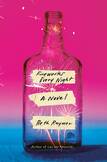Review: A Florida family’s explosive life
In Florida, you’re more likely to die by the electric chair than by a gator attack.
So warns a middle school teacher in Fireworks Every Night, the debut novel by Beth Raymer. It follows the troubled girlhood of a young woman named C.C. as she grows up in a deeply rural Florida town. In Loxahatchee, gators prowl by night and wild boars live among the palms. Nonetheless, the teacher’s advice bears true; by C.C.’s sophomore year of high school, one classmate is on death row and another on trial facing the electric chair. Such is the atmosphere of Loxahatchee, where poverty and addiction are prevalent and troubled teens abound.
Fireworks Every Night follows C.C.’s dramatic family dysfunction as they cycle between abject poverty and spend-it-while-you-have-it wealth. C.C.’s dad, Calvis, had owned a car dealership in Adena, Ohio. But both the dealership and the family’s house “mysteriously” burned to the ground in the same night; it is an open secret Calvis set them alight for the insurance payout. That money is what funds the family’s migration south.
In Florida, you’re more likely to die by the electric chair than by a gator attack.
Florida is meant to be a paradise for them, a magical place where there are fireworks every night. Instead, the family starts on an irreversible slide from dysfunction to destruction. At their lowest, the family lives together in a single tent in a Florida swamp. At their highest, they cruise through Palm Beach in a Corvette, running up huge restaurant bills while eating caviar. Then the cycle begins again and they return to destitution: empty cabinets, stealing from the supermarket, begging neighbors for donations.
The family dynamic in Fireworks Every Night is one of deep-cutting betrayal and shocking selfishness. As relationships devolve and behavior becomes increasingly erratic, the narrative becomes saturated with sex and emotional violence. Suicide by shotgun is an omnipresent threat—as is forced institutionalization for mental health.
C.C. tries to stay on the straight and narrow, excelling in basketball and trying to keep the peace in her family. Unsupported after a significant trauma, her sister Lorraine becomes rebellious and unruly, spiraling into drug addiction and pregnancy. Her mom becomes hysterical, carrying a shotgun with her throughout the house, and her dad becomes increasingly drunk and absent. Infidelity and divorce loom. Rather than give a single cent away in alimony, C.C.’s dad spends every dollar they have, bankrupting the family out of spite.
Despite the total brokenness of the home—her father’s alcoholism, her mom’s suicide threats, the phone lines being tapped to catch her mother cheating—C.C. tries to rationalize it all away. “We were a normal middle-class American family…. Whatever emotions I felt for my family I thought of as love.”
This is one of the many ways the novel deals with themes of class. Interspersed throughout the narrative are chapters covering C.C.’s adult life after leaving Florida. Her life looks glamorous, the result of marrying into a trust fund that should ensure she will never want for anything again. But the security rings hollow for her as the scars of her childhood remain present. After a complicated relationship with her father, who both gave and took away her financial security in turn, C.C. can never be comfortable trusting somebody else’s money to provide for her. She is condemned to reflect the dysfunction of her childhood like a funhouse mirror, warping and refracting but never escaping the trauma. This holds especially true as her family re-enters her adult life, her mother now long estranged and her father homeless.
These are common themes throughout the author’s own life and works. Raymer is best known for her 2010 gambling memoir, Lay the Favorite, which follows her ascent in the shady world of high-stakes sports betting. (It was popular enough that it was adapted into a movie of the same name in 2012, starring Bruce Willis, Rebecca Hall, Catherine Zeta-Jones and Vince Vaughn.) As her first novel, Fireworks Every Night plays to her memoir chops, blending fiction with themes from her own life to create a novel that reads like narrative nonfiction.
Raymer herself grew up in West Palm Beach, about a 30-minute drive from Loxahatchee. She had a job in social work helping troubled teenage girls, doubtlessly informing how she wrote about C.C.’s traumatized sister and her descent into addiction. And Raymer, like C.C., had a complicated relationship with her own homeless father; both Raymer’s real dad and C.C.’s fictional one were heavy drinkers, used car salesmen and divorced.
Fireworks Every Night plays to Raymer's memoir chops, blending fiction with themes from her own life to create a novel that reads like narrative nonfiction.
That father-daughter relationship is one of the central themes of the novel. For better or for worse, C.C. is devoted to her dad despite the trauma he puts her through. Toward the end of the novel, when their house is being foreclosed on and there is nothing to eat because her dad has intentionally bankrupted them, C.C. finds him crying.
“My instinct,” C.C. says, “was to drop to my knees and cling to him, the way women did to Christ in movies.” She is scared by his erratic behavior as he grabs a container of gasoline, fearing he is going to kill them both—possibly by burning their house down again. Instead, he teaches her how to use a gas-powered lawn mower, a bizarre final life lesson. Then he hops in the Corvette, the last thing they have to their name, and abandons her.
They don’t see each other again for years, until C.C. is in her trust-fund marriage and her dad is in a homeless shelter; when an unknown Florida number calls her, C.C. knows it’s her father and picks up immediately. But despite her willingness to reconnect, when they first reunite, C.C. again is fleetingly afraid he might kill her. It is one of the best examples of the intertwining of family and trauma throughout the book, where love and fear go hand in hand.
Fireworks Every Night is a deeply Floridian novel. It is in some ways an ode to the rattlesnakes, the humid heat and the Palm Beach pretensions of those who out of necessity live a life apart from that glitz and glamor, trapped by their circumstances and their own toxicity. No happy stories lie here; this is not a feel-good tale of rags to riches or of overcoming adversity. But it is a compelling portrait of deep dysfunction, of the slow slide into familial destruction: not the festive lights of a paradise but the fireworks of a family exploding.
This article also appeared in print, under the headline “A Florida Family’s Explosive Life,” in the September 2023, issue.










